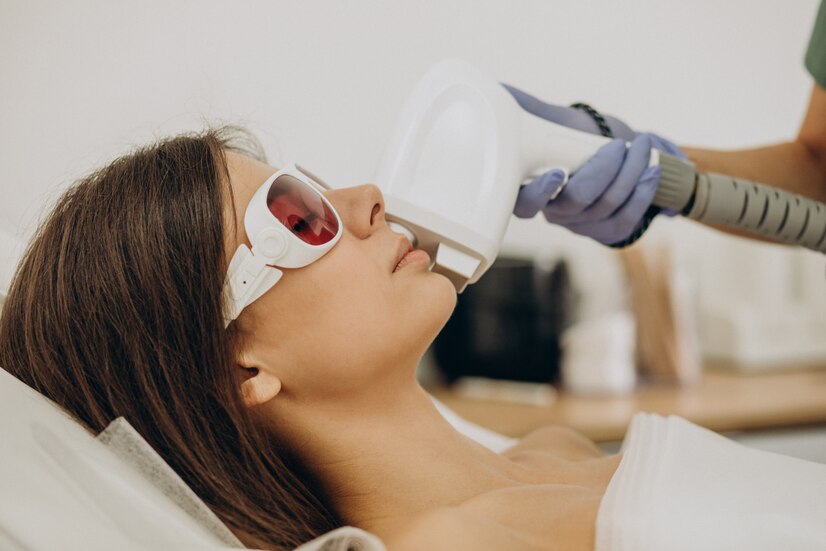Laser Hair Removal for Dark Skin: Is It Safe and Effective?

Laser Hair Removal for Dark Skin: Is It Safe and Effective?
In the realm of beauty and grooming, laser hair removal has emerged as a game-changer, offering a convenient and long-lasting solution to unwanted hair. However, for individuals with darker skin tones, concerns about safety and efficacy often arise. The quest for smooth, hair-free skin shouldn’t come with risks or limitations. This blog delves into the crucial question: Is laser hair removal a viable option for those with darker skin? We’ll explore the science behind the procedure, address common misconceptions, and provide insights to empower you in making informed decisions about your skincare journey. Let’s navigate through the complexities and possibilities together.
Understanding Laser Hair Removal
Laser hair removal is a popular cosmetic procedure that aims to reduce or eliminate unwanted hair by targeting hair follicles with concentrated light energy. The process involves using a handheld device that emits a specific wavelength of light, which is absorbed by the pigment in the hair follicles. This absorption generates heat, damaging the follicle and inhibiting future hair growth. It’s crucial to comprehend that laser hair removal is not a one-time solution; multiple sessions are typically required to achieve desired results due to the hair growth cycle.
During each session, the laser targets actively growing hair follicles, which make up only a portion of the total hair follicles present on the skin. As a result, multiple sessions spaced several weeks apart are necessary to target all the hair follicles effectively. Understanding the mechanism behind laser hair removal helps individuals set realistic expectations and commit to the recommended treatment plan for optimal results.
The Importance of Skin Tone Consideration
Skin tone plays a pivotal role in the safety and effectiveness of laser hair removal. The procedure works by targeting melanin, the pigment responsible for hair and skin color. Darker skin contains higher levels of melanin, which can absorb more laser energy, increasing the risk of burns, hyperpigmentation, and other adverse effects if not performed correctly. Therefore, it’s essential for individuals with darker skin tones to seek out practitioners experienced in treating diverse skin types and using appropriate laser technologies.
Considering skin tone also influences the selection of laser parameters, such as wavelength and pulse duration, to minimize the risk of complications while still achieving desired results. Consulting with a qualified dermatologist or licensed laser technician is crucial to assess individual skin characteristics and customize treatment plans accordingly. By prioritizing skin tone consideration, individuals can undergo laser hair removal safely and effectively, achieving smoother, hair-free skin without compromising their skin health.
Safety Concerns for Darker Skin Tones
While laser hair removal is generally considered safe for all skin types, including darker skin tones, there are specific safety concerns that need to be addressed. One of the primary concerns is the potential for skin damage, including burns, blistering, and changes in pigmentation. Darker skin contains more melanin, which can absorb more laser energy and increase the risk of adverse effects if not properly managed.
To mitigate these risks, it’s crucial for individuals with darker skin tones to seek out practitioners who are experienced in treating diverse skin types and have access to advanced laser technologies specifically designed for darker skin. Additionally, using appropriate cooling methods before, during, and after the procedure can help minimize discomfort and reduce the risk of adverse reactions.
Effectiveness on Various Skin Types
The effectiveness of laser hair removal can vary depending on individual skin characteristics, including skin type and color. While the procedure is generally suitable for all skin types, including fair, olive, and darker skin tones, there are factors that can influence its efficacy.
One crucial factor is the contrast between the color of the hair and the surrounding skin. Laser hair removal works best when there is a significant difference in color between the hair and the skin, as this allows the laser to target the hair follicles more precisely. Dark hair on light skin tends to respond most effectively to laser treatment, as the contrast is high and the melanin in the hair follicles absorbs more laser energy. However, advancements in laser technology have made it possible to achieve effective results on darker skin types as well. Nd:YAG lasers, for example, are specifically designed to target melanin in the hair follicles while minimizing the risk of damage to surrounding skin tissue, making them safer and more effective for individuals with darker skin tones.
Potential Risks and Side Effects
Like any cosmetic procedure, laser hair removal carries some potential risks and side effects, particularly for individuals with darker skin tones. One of the most common risks is the possibility of skin damage, including burns, blistering, and changes in pigmentation. Darker skin contains more melanin, which can absorb more laser energy and increase the risk of adverse reactions if not properly managed.
To minimize the risk of complications, it’s essential to seek out practitioners who are experienced in treating diverse skin types and have access to advanced laser technologies specifically designed for darker skin. Additionally, using appropriate cooling methods before, during, and after the procedure can help reduce discomfort and protect the skin from damage.
Debunking Myths and Misconceptions
Laser hair removal has gained popularity as a convenient and long-lasting solution for unwanted hair, but it’s not without its fair share of myths and misconceptions, especially concerning its safety and efficacy for darker skin tones. One common misconception is that laser hair removal is not suitable for individuals with darker skin due to the risk of skin damage.
In reality, while darker skin tones do require special considerations to ensure safety and effectiveness, laser hair removal can be a viable option for individuals of all skin types. Advanced laser technologies, such as Nd:YAG lasers, are specifically designed to target melanin in the hair follicles while minimizing the risk of damage to surrounding skin tissue, making them safe and effective for darker skin tones. Another myth surrounding laser hair removal is that it is a painful or uncomfortable procedure. While some individuals may experience mild discomfort during treatment, advancements in laser technology and cooling methods have made the procedure more tolerable than ever before. Additionally, many practitioners offer numbing creams or cooling devices to minimize discomfort during treatment.
Choosing the Right Laser Technology
Selecting the appropriate laser technology is crucial for the success of laser hair removal, especially when considering darker skin tones. Not all lasers are created equal, and certain types are better suited for specific skin types and hair colors. For individuals with darker skin tones, lasers that target melanin with longer wavelengths, such as Nd:YAG lasers, are often recommended. These lasers can penetrate deeper into the skin without significantly affecting the surrounding tissue, reducing the risk of adverse effects like burns or hyperpigmentation.
When choosing a laser technology, it’s essential to consider factors such as the practitioner’s expertise, the clinic’s equipment, and the safety features of the laser device. It’s recommended to seek out clinics with experienced practitioners who specialize in treating diverse skin types and have a proven track record of success with laser hair removal.
Preparing for Laser Hair Removal
Proper preparation is key to ensuring a successful and comfortable laser hair removal experience. Before the procedure, individuals should follow specific guidelines provided by their practitioner to maximize the effectiveness of the treatment and reduce the risk of adverse effects.
One essential step in preparing for laser hair removal is avoiding sun exposure and tanning beds in the weeks leading up to the procedure. Sun exposure can increase the risk of burns and other complications, especially for individuals with darker skin tones. It’s also important to avoid waxing, plucking, or electrolysis in the treatment area, as these methods can disrupt the hair follicles and interfere with the laser’s ability to target them effectively. Additionally, individuals may be advised to shave the treatment area a day or two before their appointment to ensure that the laser can target the hair follicles beneath the skin’s surface. This allows for more precise and efficient treatment with less discomfort.
Post-Treatment Care for Dark Skin
Proper post-treatment care is essential for maintaining the health and appearance of the skin, especially for individuals with darker skin tones who may be more prone to adverse reactions following laser hair removal. After each session, it’s important to follow specific guidelines provided by the practitioner to minimize discomfort and reduce the risk of complications.
One crucial aspect of post-treatment care is avoiding sun exposure in the days and weeks following laser hair removal. Sun exposure can increase the risk of hyperpigmentation and other adverse effects, so it’s essential to protect the treated area with sunscreen or protective clothing whenever outdoors.
In Conclusion, laser hair removal for darker skin tones presents both opportunities and considerations. At American Laser Med Spa, our mission is clear: to transform lives by making people feel young, beautiful, and confident while building a supportive community. Your safety and satisfaction are paramount to us, and we’re dedicated to providing the highest level of patient care. Ready to embark on your journey to smoother, hair-free skin? Contact us today at 915-760-5123 or email us at Elpaso@americanlaser-medspa.com. Let’s unlock your confidence together.






